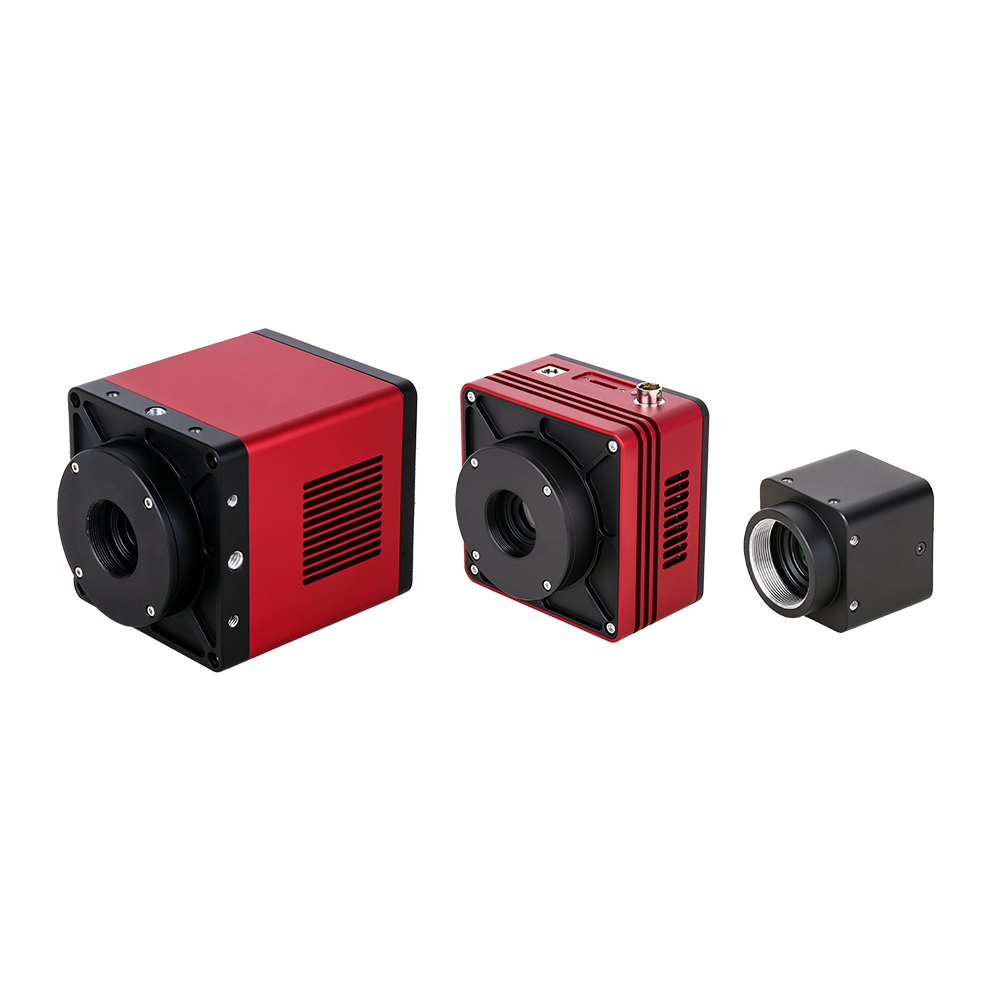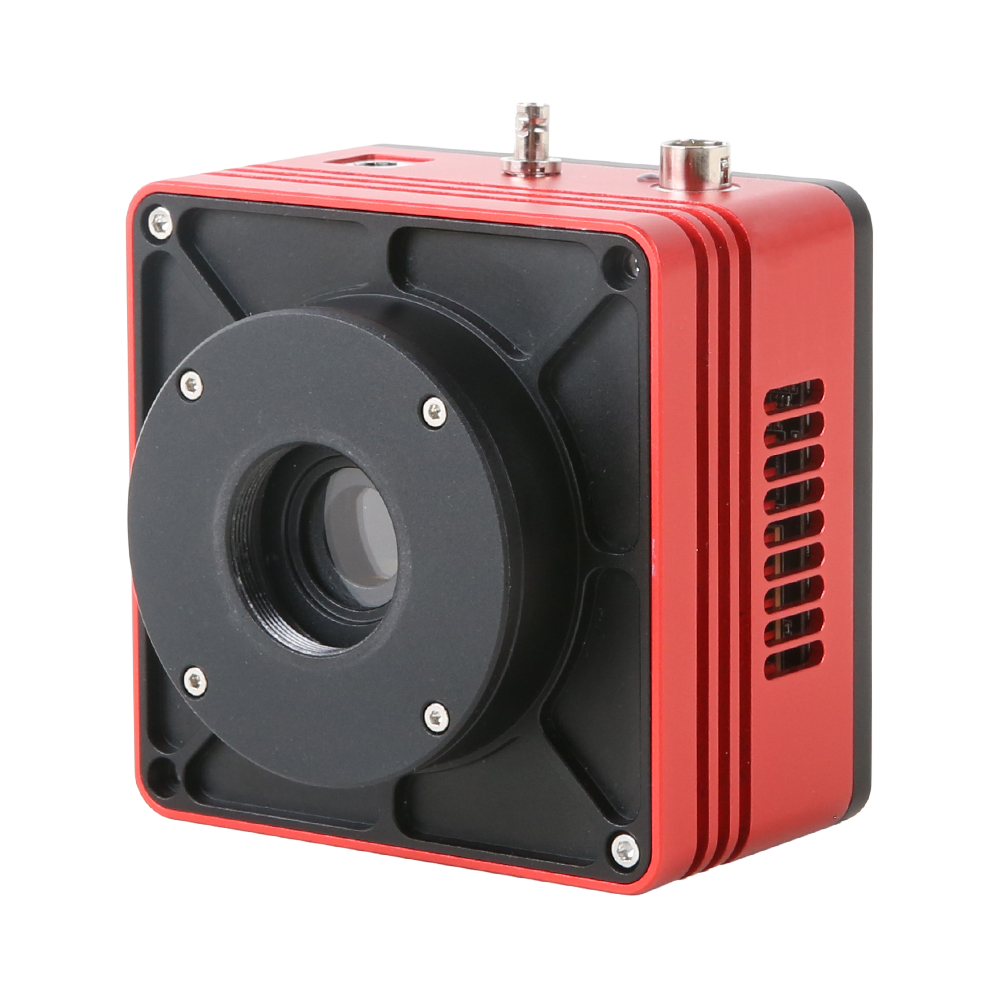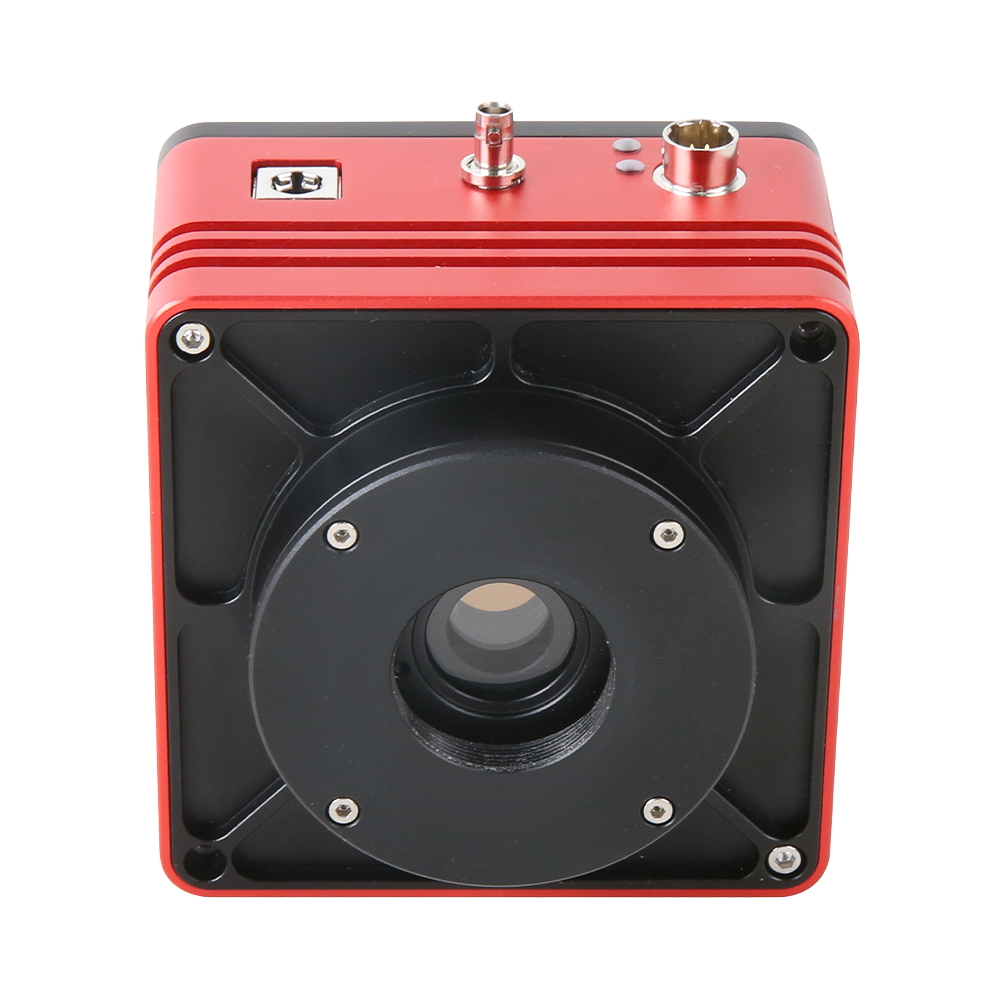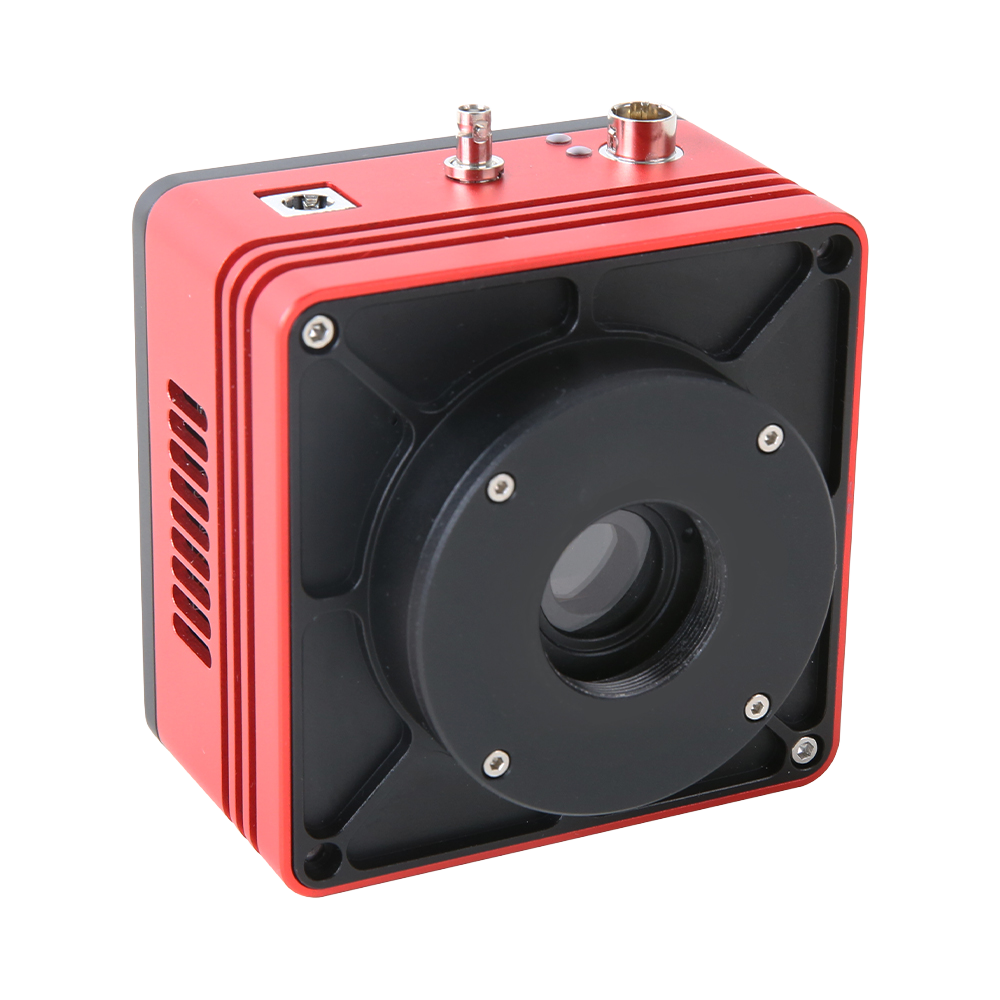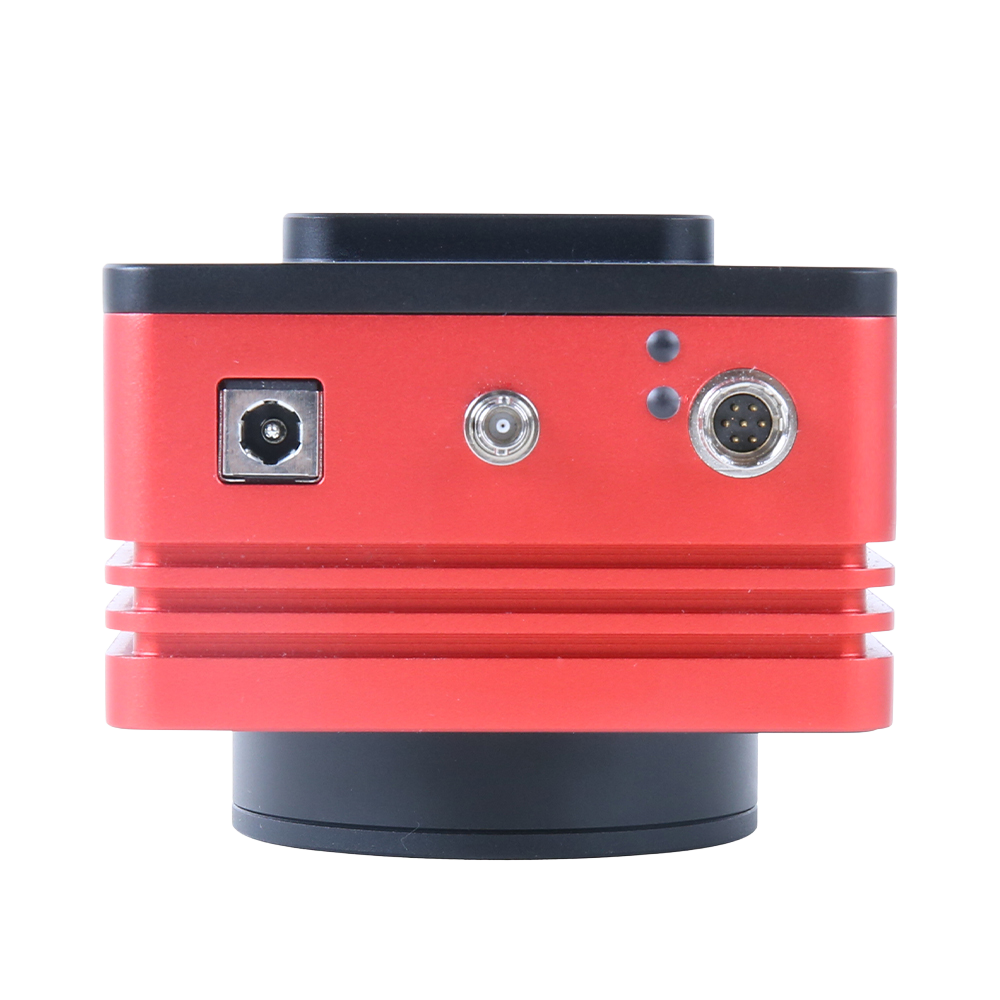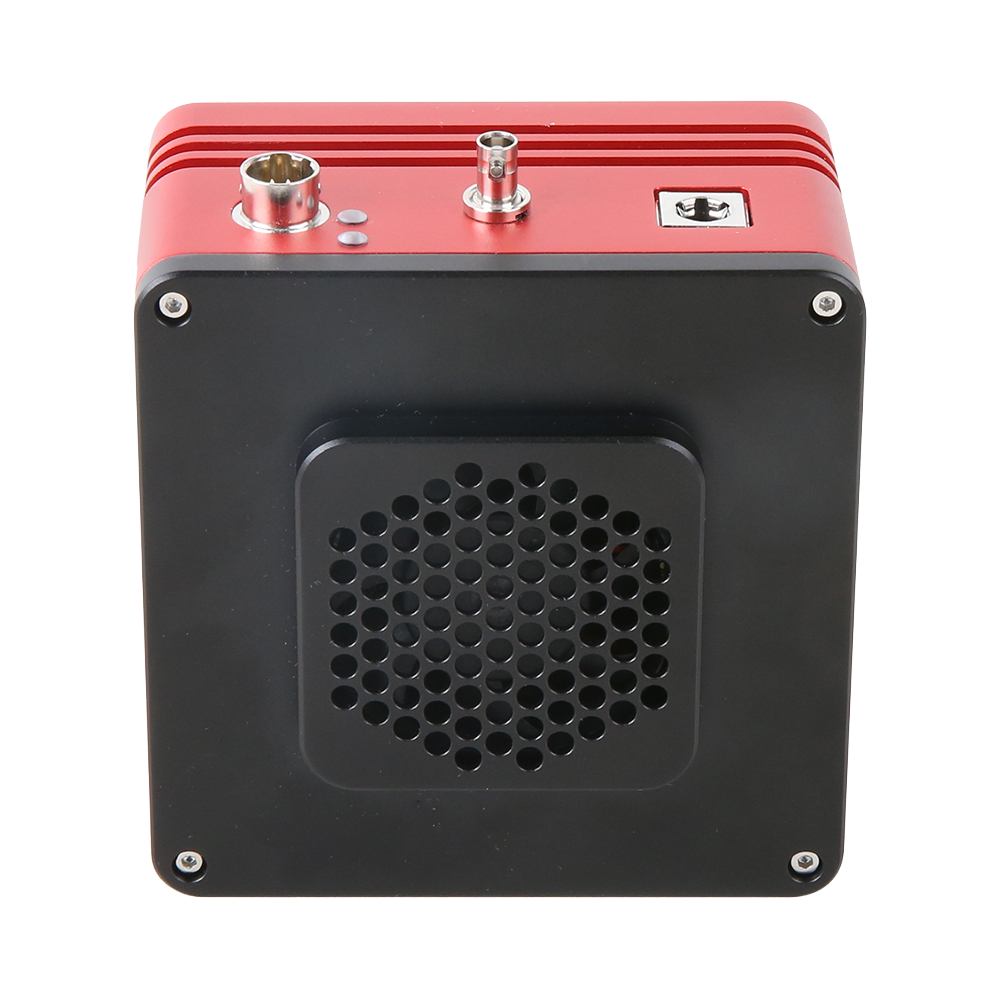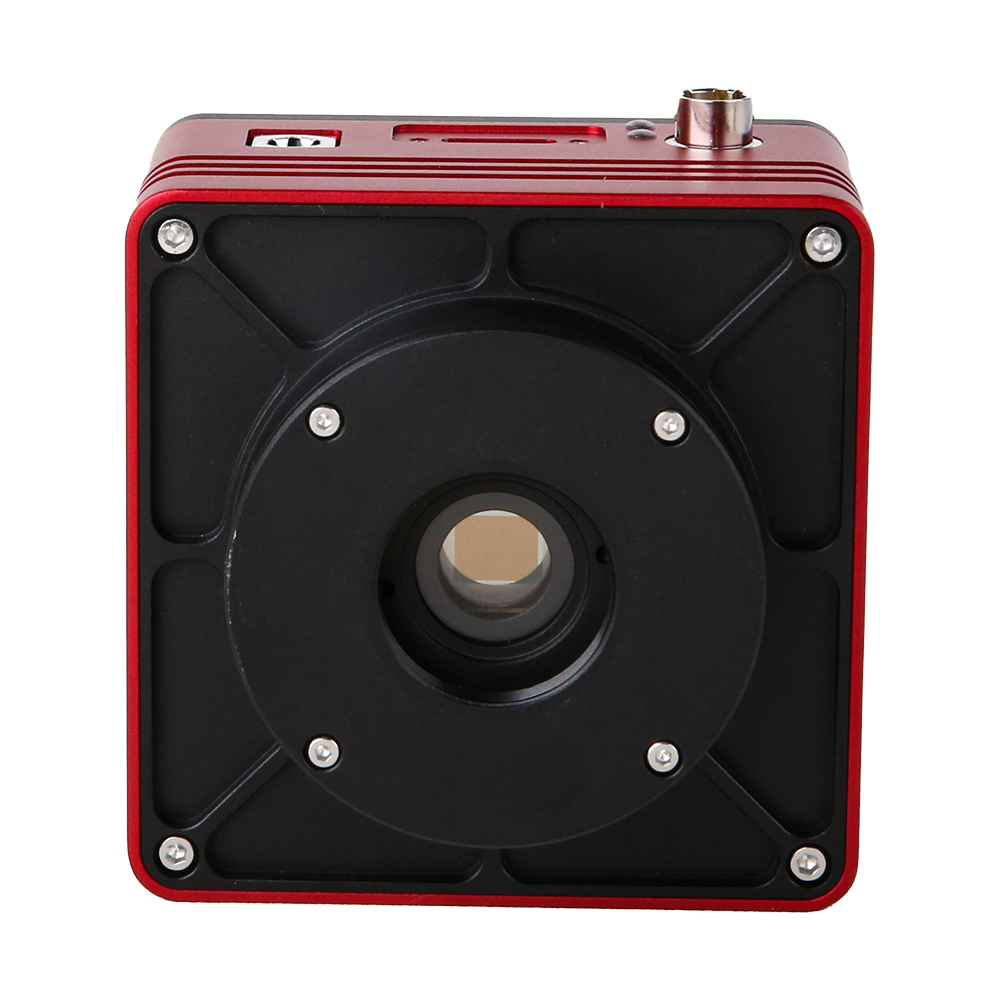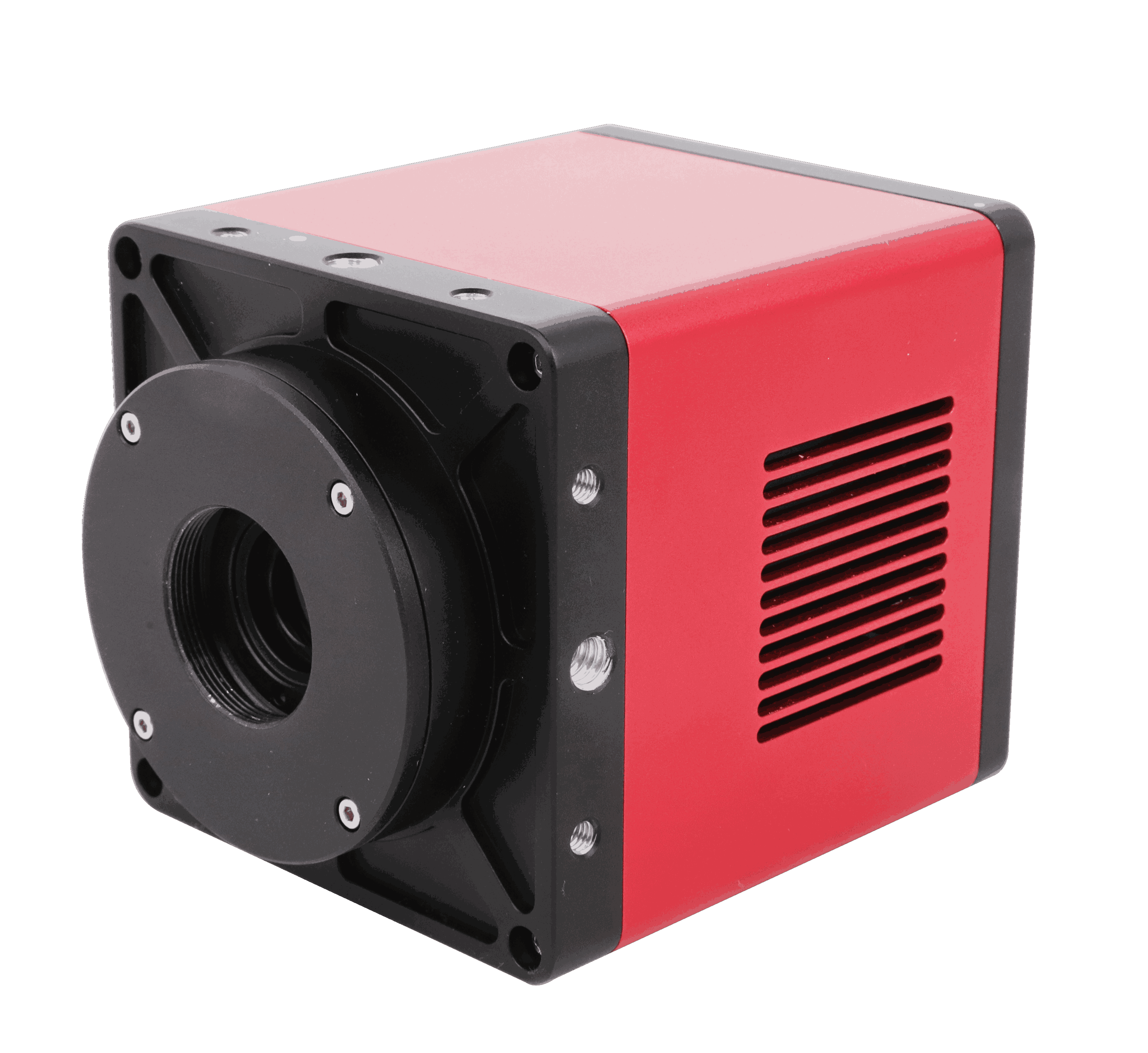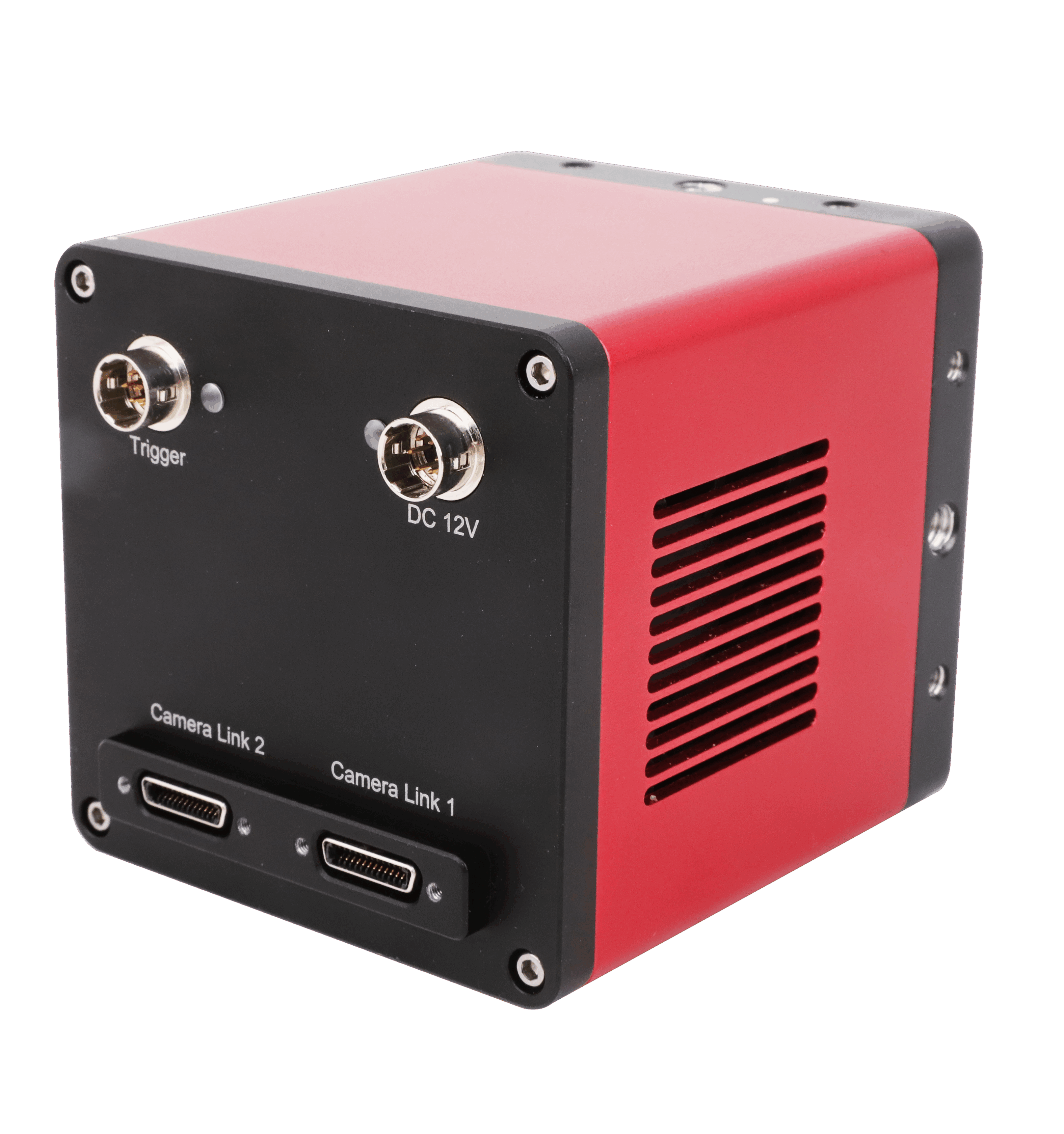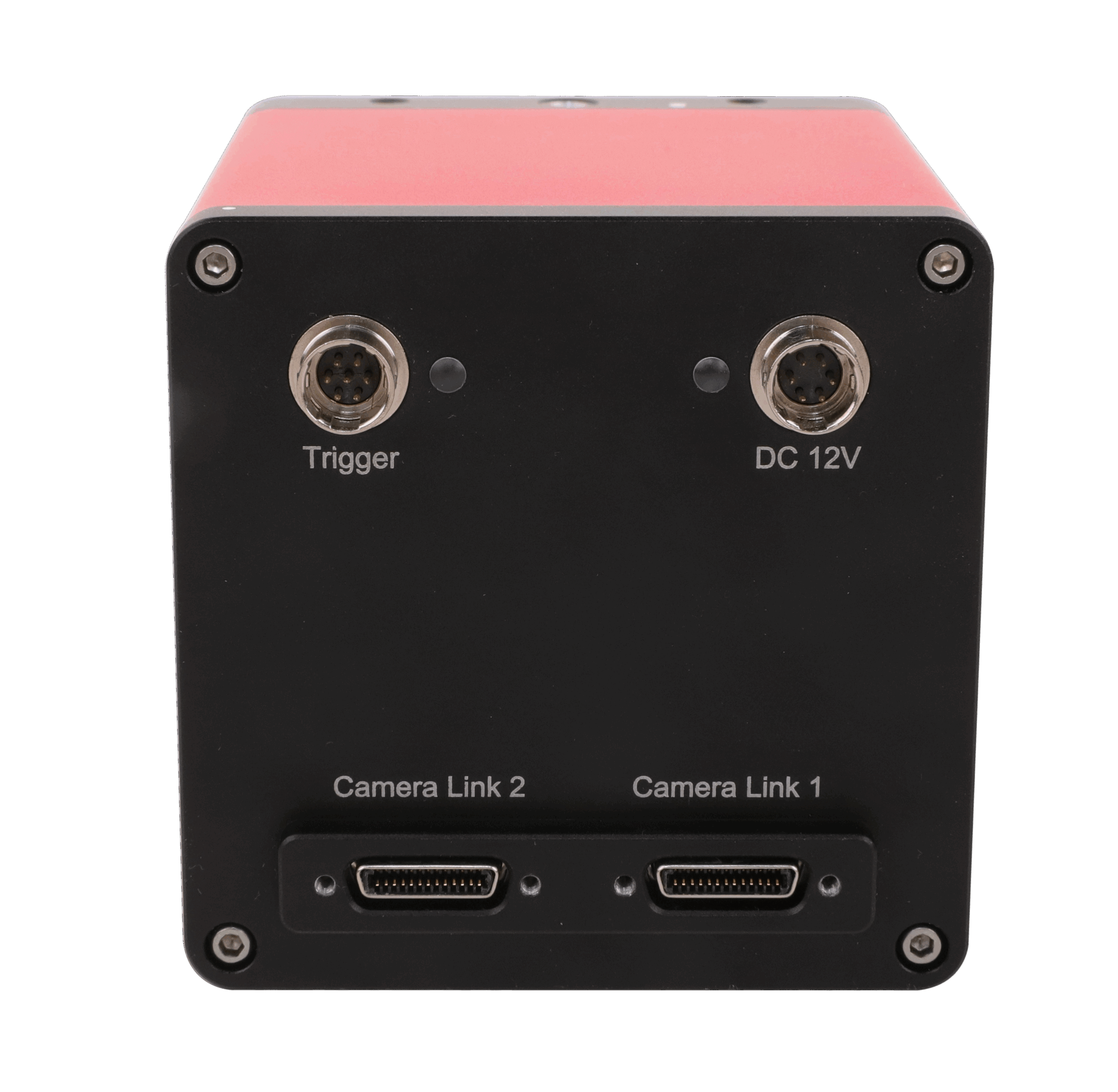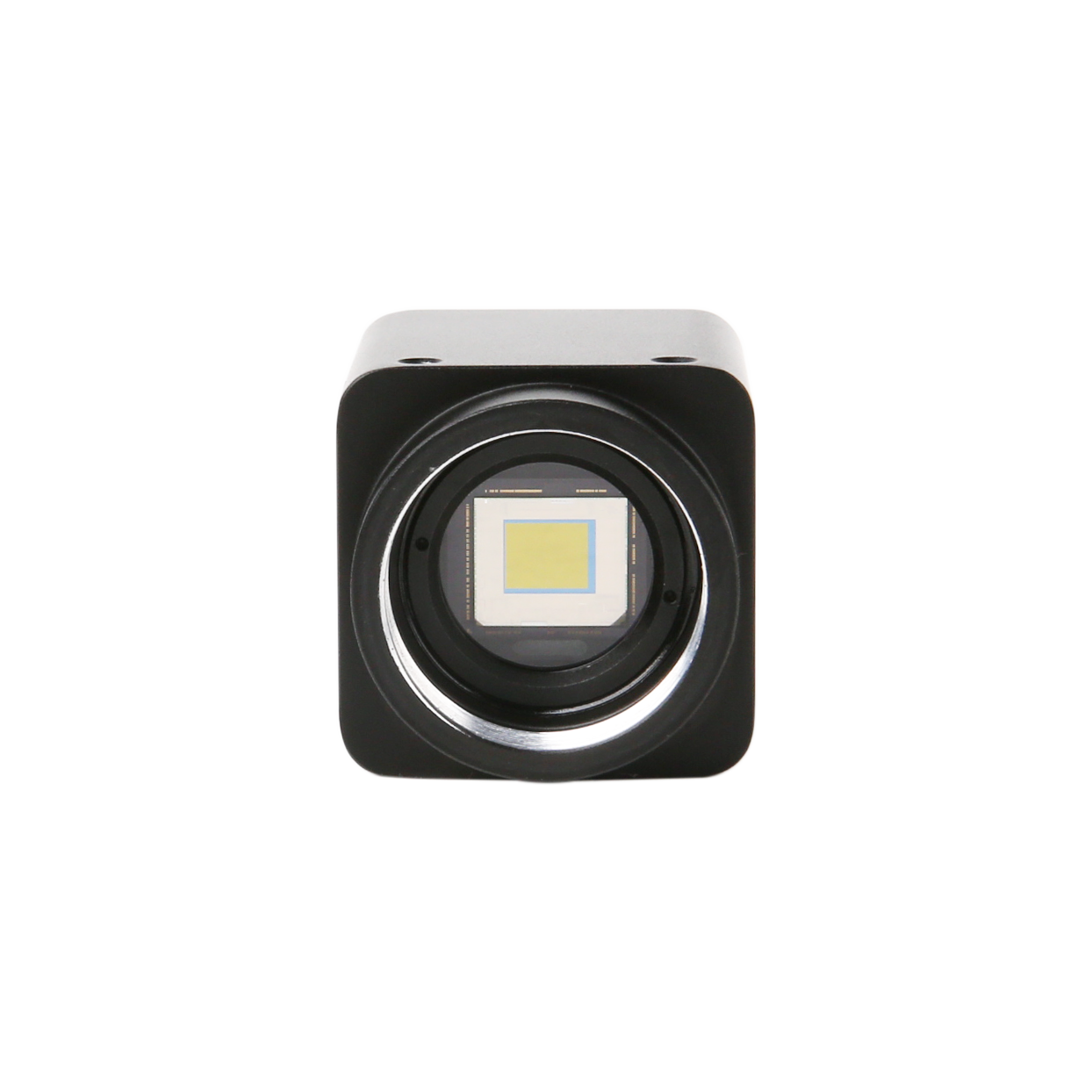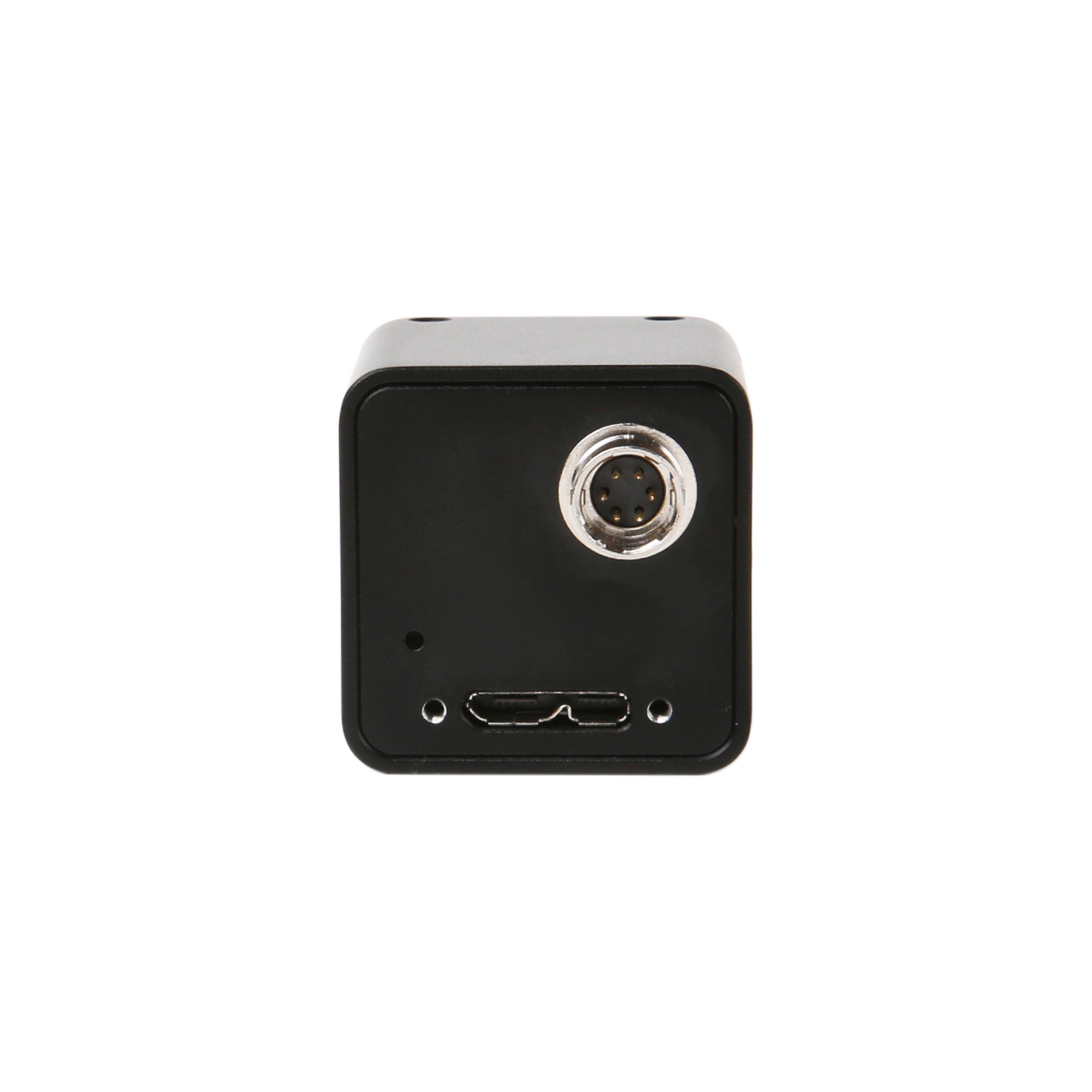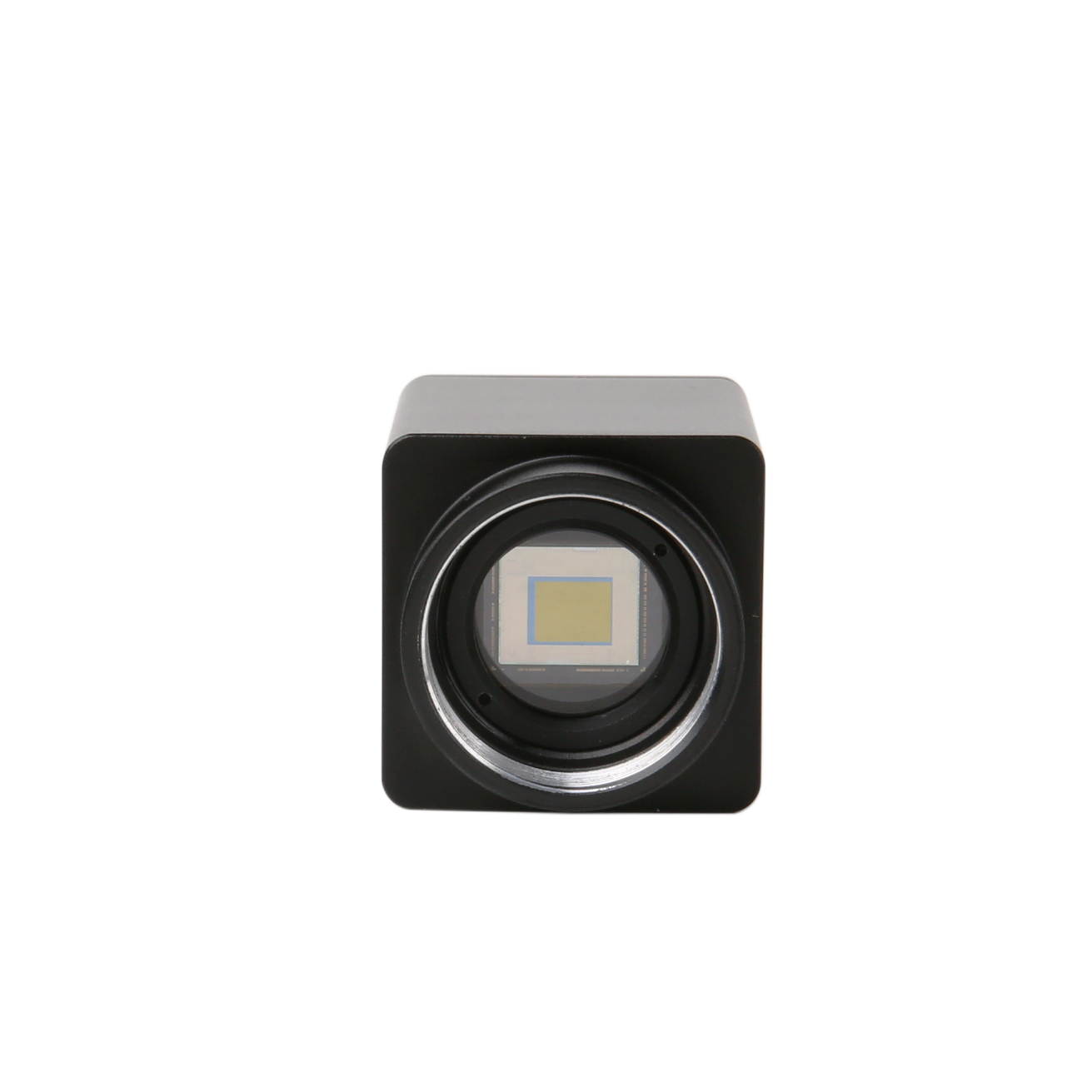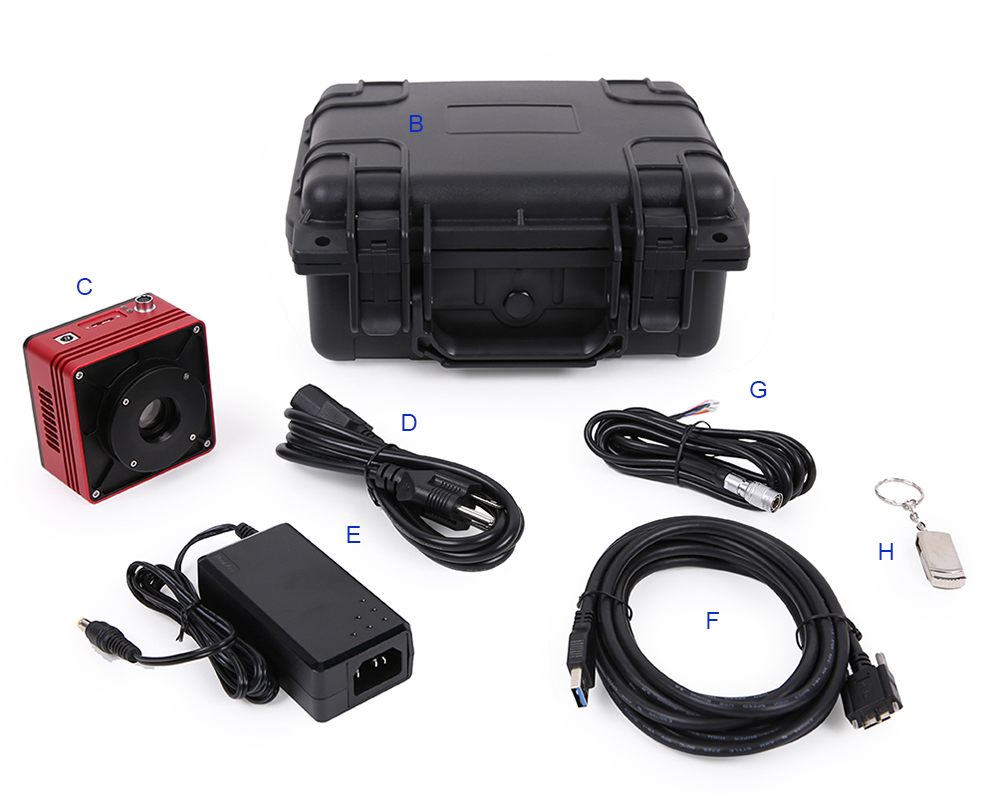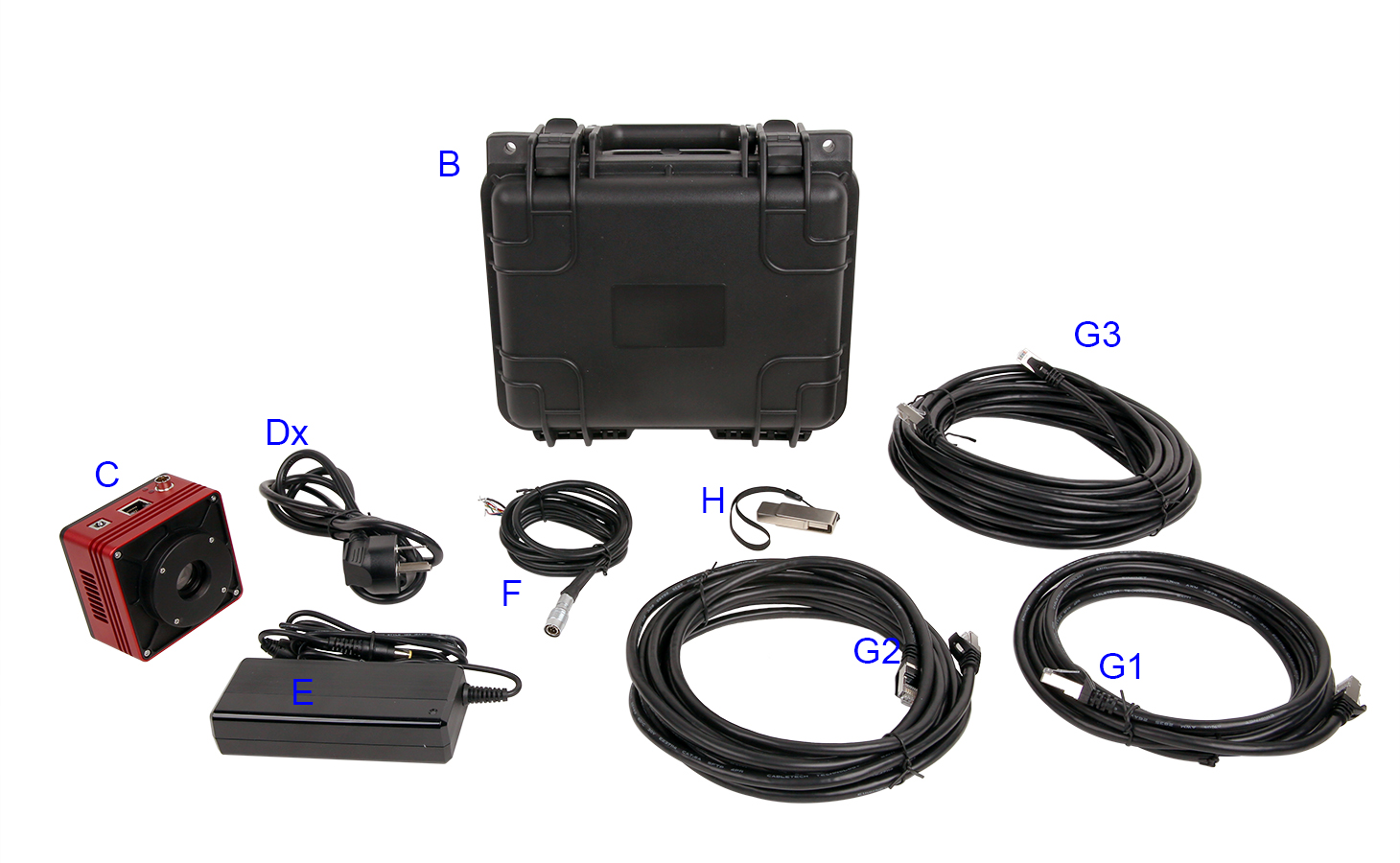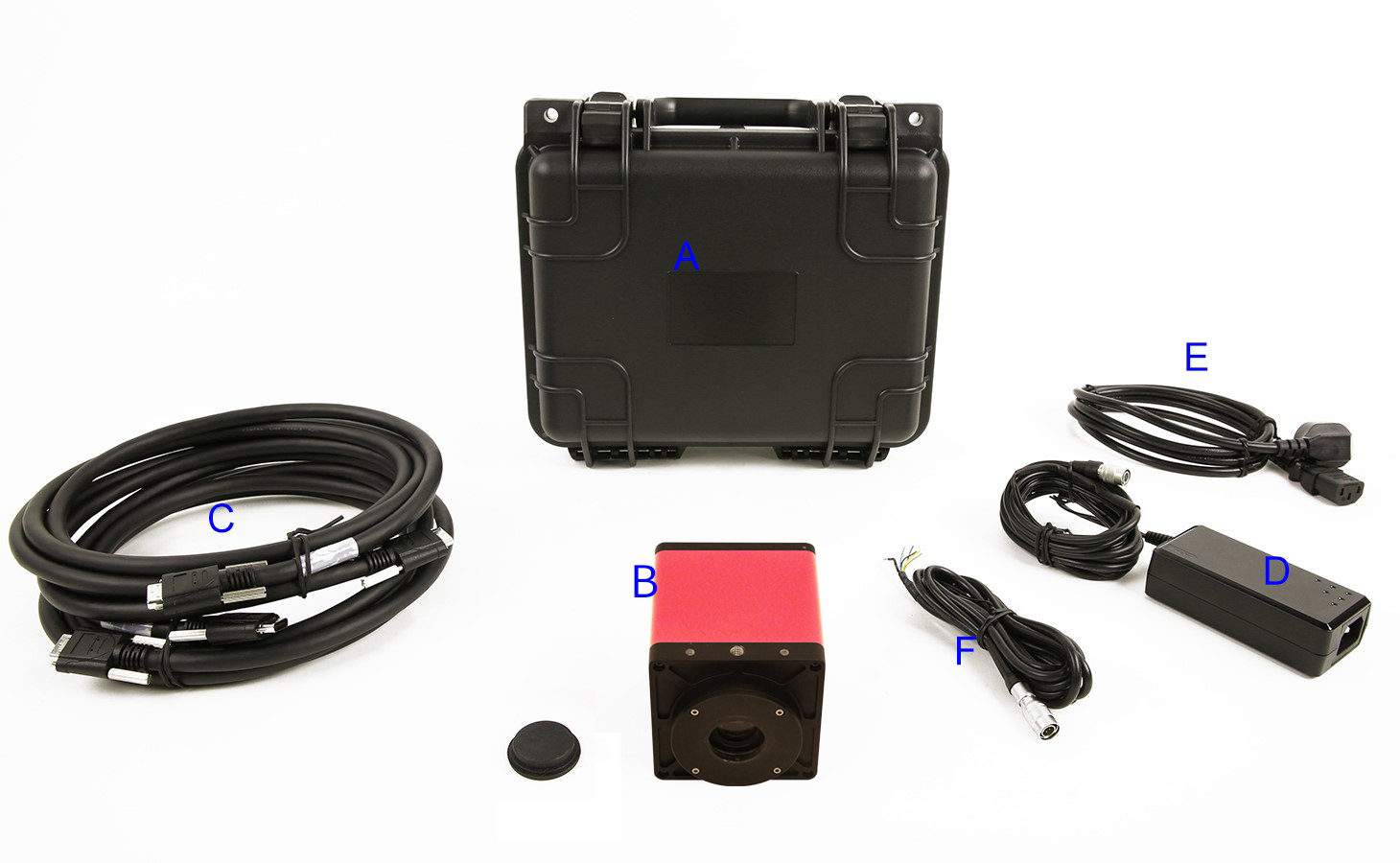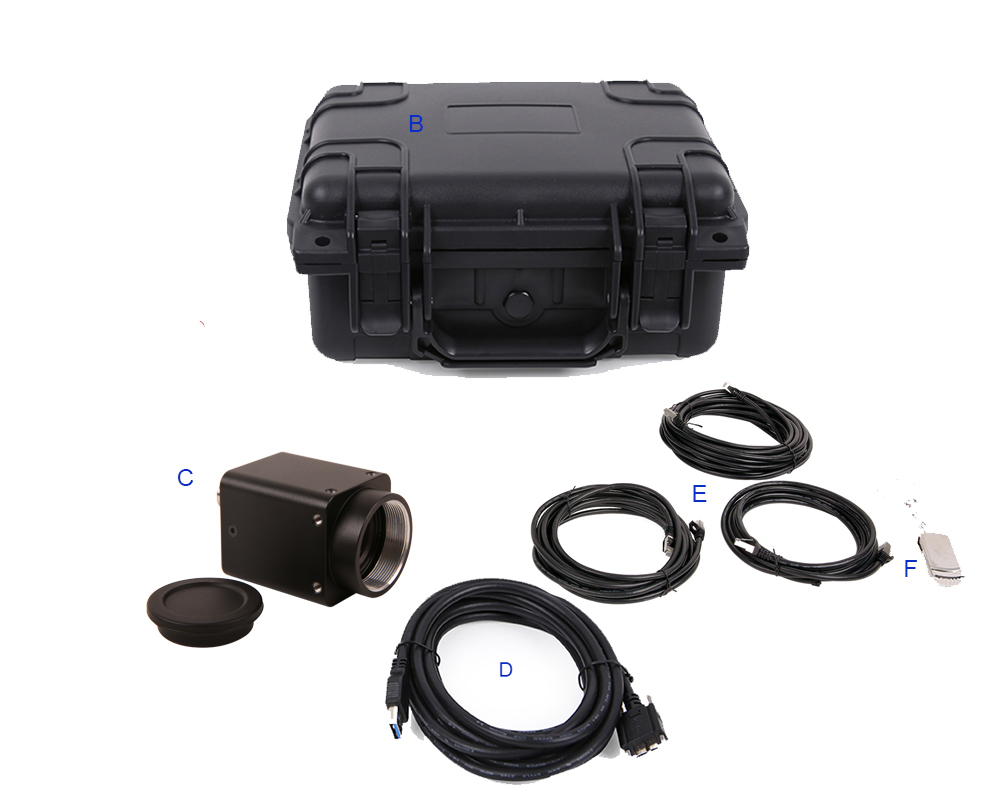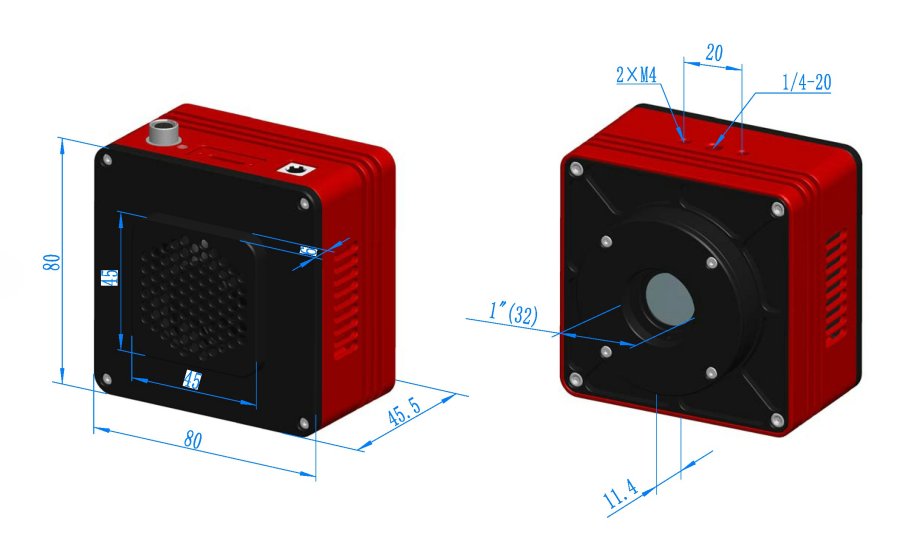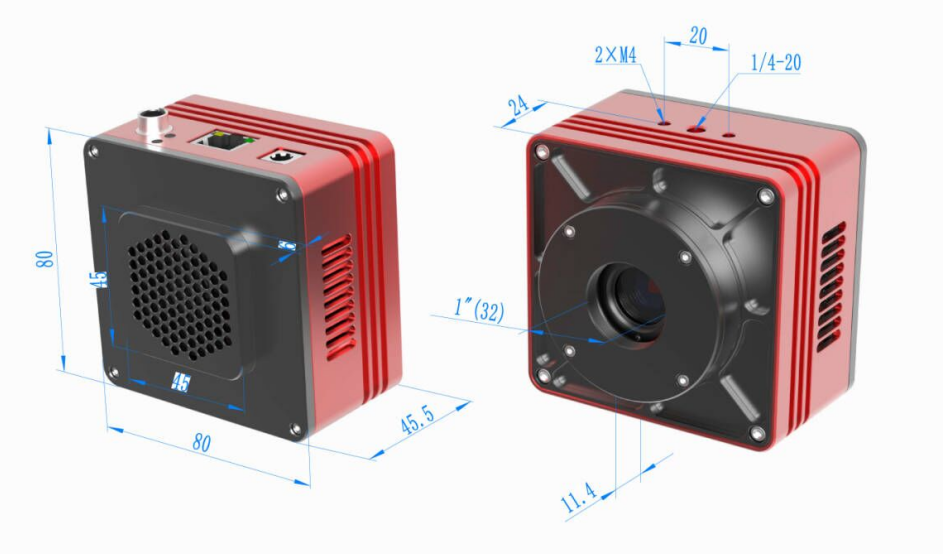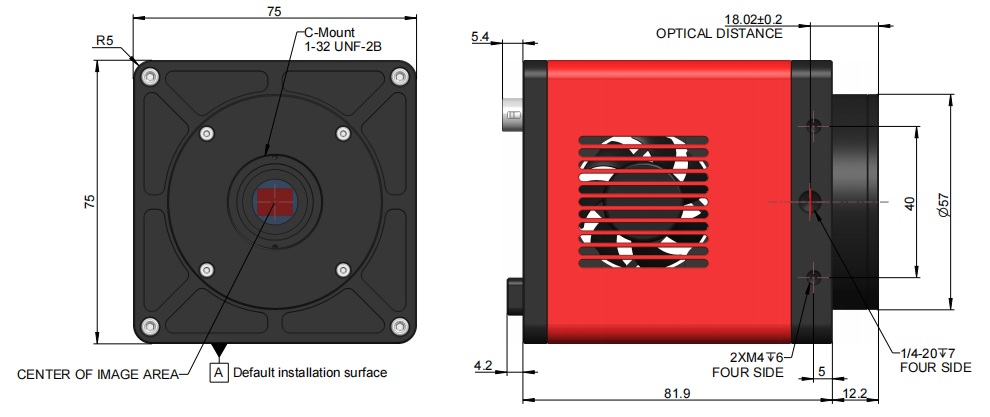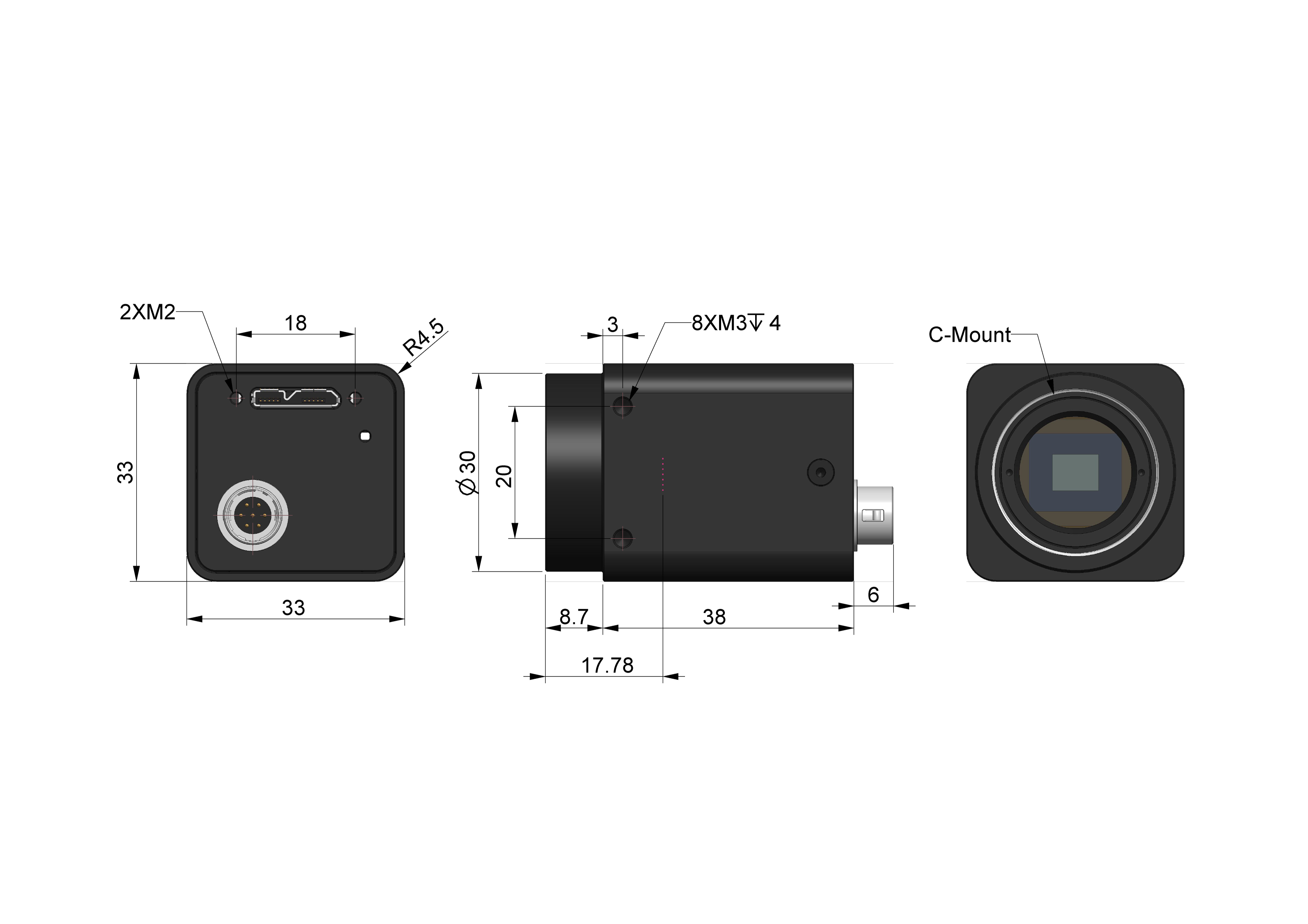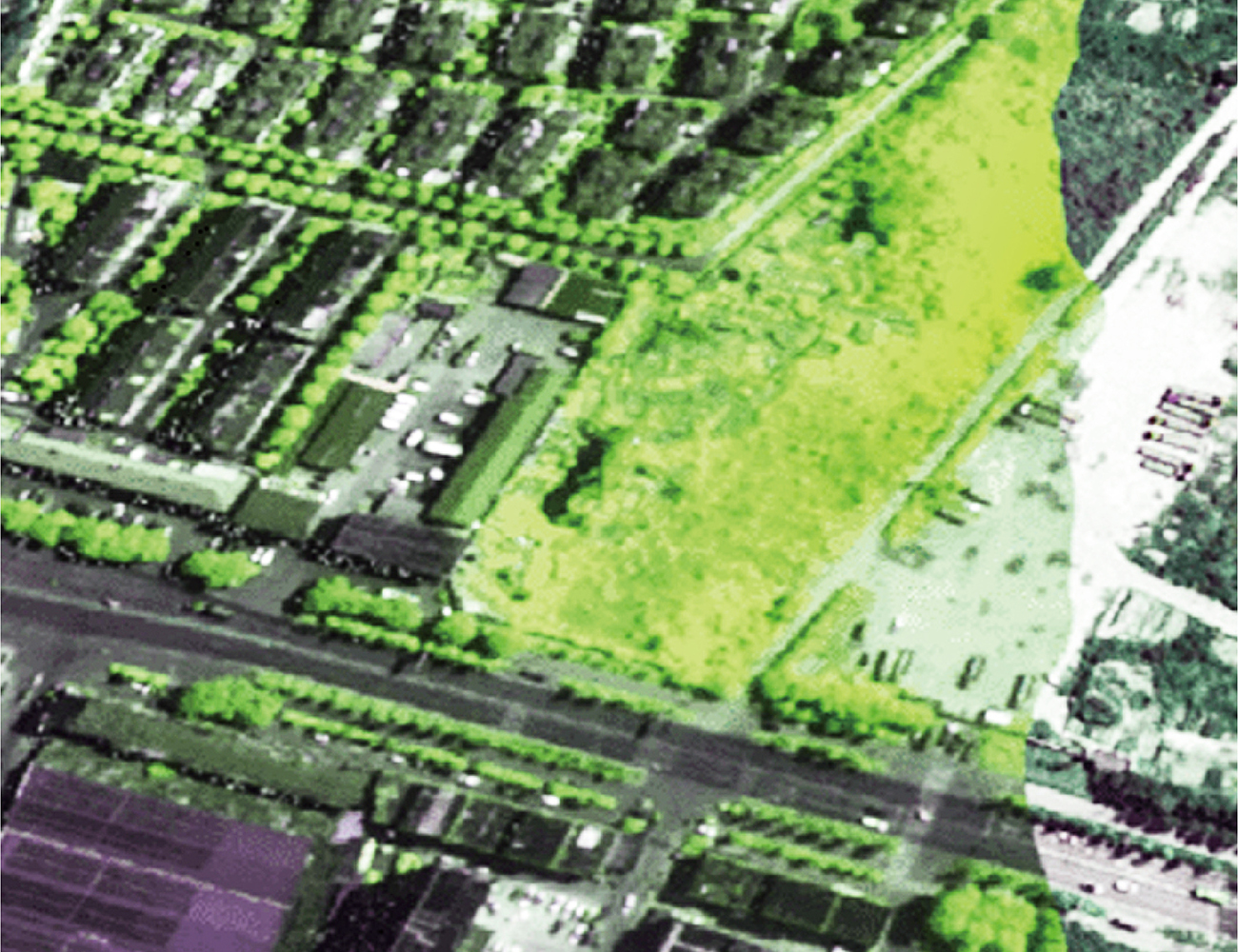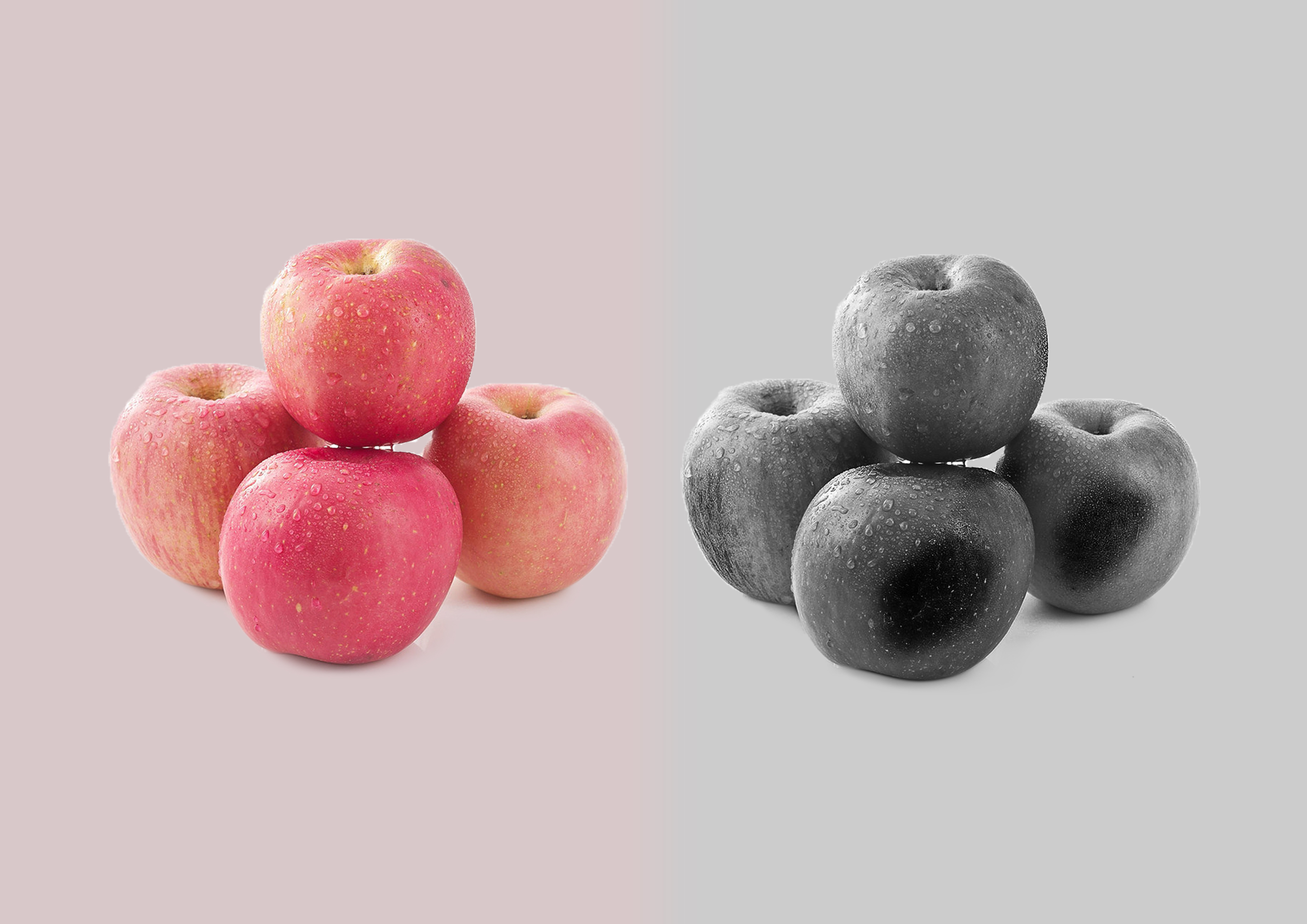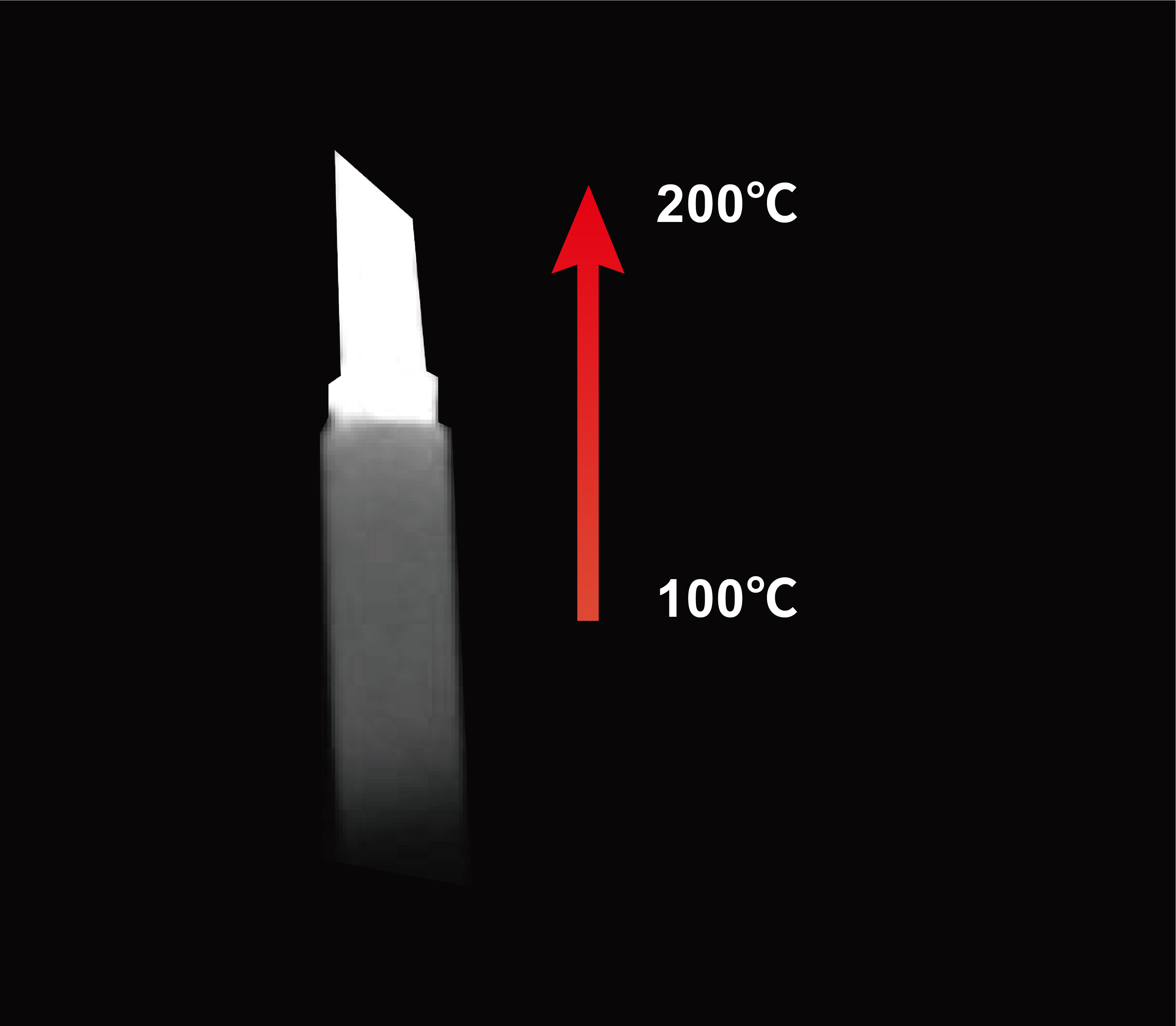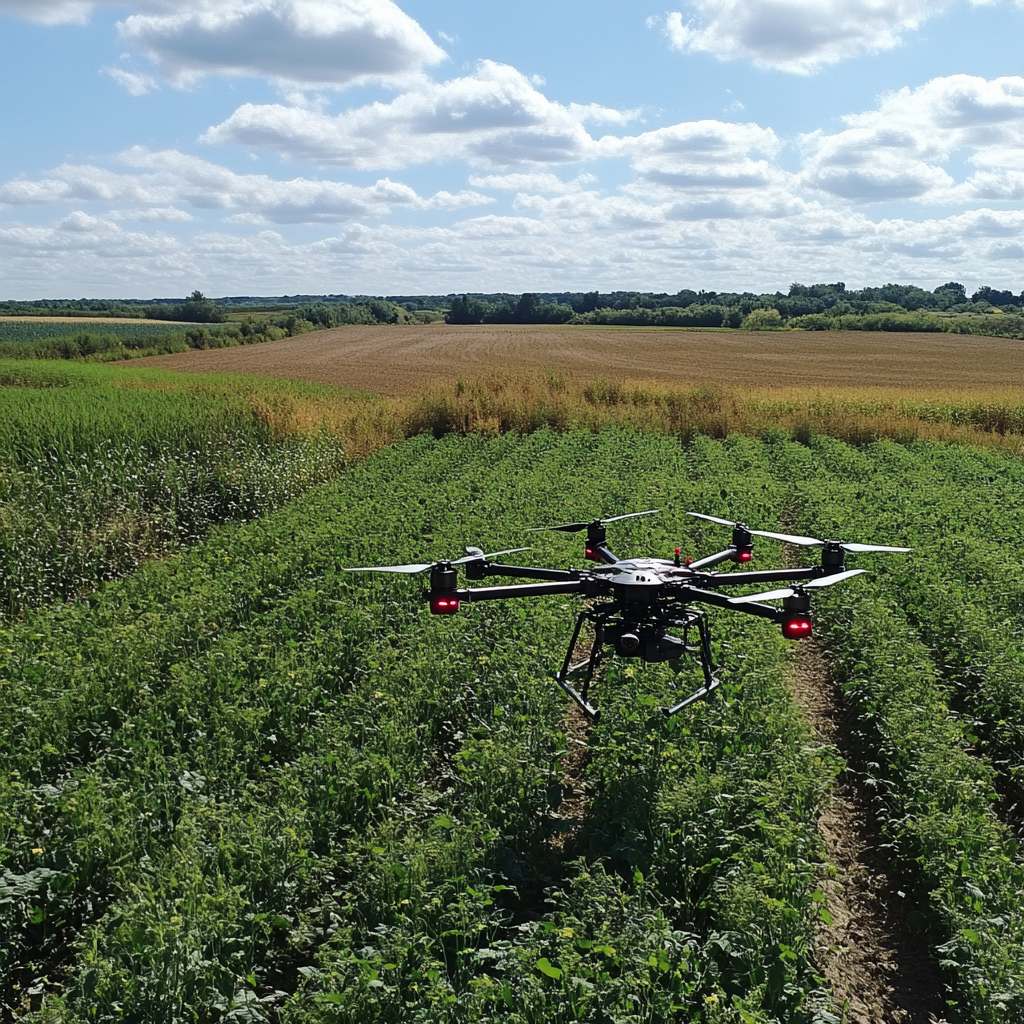400–1700 nm IMX992 5MP InGaAs Series Short-Wave Infrared Camera
Product Introduction
Featuring the Sony IMX992 SenSWIR InGaAs sensor (3.45 µm pixel size), covering the 400–1700 nm spectral band, with support for USB3 / 10GigE / CoaXPress / CameraLink / GigE and other interfaces. Available in deep cooling and uncooled versions, combining high resolution, high dynamic range, and low noise characteristics, suitable for scientific imaging, semiconductor inspection, laser imaging, and other high-end applications.
Product Features
- Sony IMX992 SenSWIR InGaAs sensor, 3.45 µm pixel size
- 400–1700 nm wide spectral response
- Multi-interface support: USB3 / 10GigE / CoaXPress / CameraLink / GigE
- Deep cooling and uncooled options available, low dark current, low noise
- Global shutter, high-speed imaging
- Up to 12-bit depth (some models support 8/10/12-bit)
- Hardware ROI, external/software triggering support
- Built-in large-capacity buffer for stable high-speed transmission
- Industrial-grade temperature and humidity range, CE / FCC certified
- Multi-platform SDK available (Windows / Linux / macOS / Android)
Product Models
SWIR Series | Sony IMX992 5MP 400–1700 nm Short-Wave Infrared Camera
| Model | Sensor / Size | Resolution | Pixel Size | Shutter | Frame Rate | Interface | Dynamic Range |
Action |
|---|---|---|---|---|---|---|---|---|
| SWIR5000KMB-CXP |
Sony IMX992-AABJ-C (InGaAs)
1/1.4" (11.31 mm) | 8.94 mm × 7.09 mm
|
5.0 MP (2560×2048) | 3.45 µm × 3.45 µm | Global shutter |
8-bit: 131 fps @ 2560×2048, 252 fps @ 1280×1024
10-bit: 120 fps @ 2560×2048, 231 fps @ 1280×1024
12-bit: 70 fps @ 2560×2048, 135 fps @ 1280×1024
|
CoaxPress |
51.3 dB (HCG); 51.36 dB (LCG)
|
View Details |
| SWIR5000KMA |
Sony IMX992-AABA-C (InGaAs)
1/1.4" (11.41 mm) | 8.94 mm × 7.09 mm
|
5.0 MP (2560×2048) | 3.45 µm × 3.45 µm | Global shutter |
61.9 fps @ 2560×2048
135.7 fps @ 1280×1024
|
USB3 |
51.36 dB (HCG); 51.47 dB (LCG)
|
View Details |
| SWIR5000KMA-10G |
Sony IMX992-AABA-C (InGaAs)
1/1.4" (11.41 mm) | 8.94 mm × 7.09 mm
|
5.0 MP (2560×2048) | 3.45 µm × 3.45 µm | Global shutter |
145 fps @ 2560×2048
278 fps @ 1280×1024
|
10GigE |
51.36 dB (HCG); 51.47 dB (LCG)
|
View Details |
| SWIR5000KMA-CXP |
Sony IMX992-AABA-C (InGaAs)
1/1.4" (11.41 mm) | 8.94 mm × 7.09 mm
|
5.0 MP (2560×2048) | 3.45 µm × 3.45 µm | Global shutter |
131 fps @ 2560×2048
252 fps @ 1280×1024
|
CoaxPress |
51.3 dB (HCG); 51.36 dB (LCG)
|
View Details |
| SWIR5000KMB |
Sony IMX992-AABJ-C (InGaAs)
1/1.4" (11.41 mm) | 8.94 mm × 7.09 mm
|
5.0 MP (2560×2048) | 3.45 µm × 3.45 µm | Global shutter |
61.9 fps @ 2560×2048
135.7 fps @ 1280×1024
|
USB3 |
51.36 dB (HCG); 51.47 dB (LCG)
|
View Details |
| SWIR5000KMB-10G |
Sony IMX992-AABJ-C (InGaAs)
1/1.4" (11.41 mm) | 8.94 mm × 7.09 mm
|
5.0 MP (2560×2048) | 3.45 µm × 3.45 µm | Global shutter |
145 fps @ 2560×2048
278 fps @ 1280×1024 (8/10-bit)
82.7 fps @ 2560×2048
158.6 fps @ 1280×1024 (12-bit)
|
10GigE |
51.36 dB (HCG); 51.47 dB (LCG)
|
View Details |
| SWIR5000KMB-UMV |
Sony IMX992-AABJ-C (InGaAs)
1/1.4" (11.41 mm) | 8.94 mm × 7.09 mm
|
5.0 MP (2560×2048) | 3.45 µm × 3.45 µm | Global shutter |
61.9 fps @ 2560×2048
135.7 fps @ 1280×1024
|
USB3 |
51.36 dB (HCG); 51.47 dB (LCG)
|
View Details |
| SWIR5000KMB-GMV |
Sony IMX992-AABJ-C (InGaAs)
1/1.4" (11.41 mm) | 8.94 mm × 7.09 mm
|
5.0 MP (2560×2048) | 3.45 µm × 3.45 µm | Global shutter |
22 fps @ 2560×2048
11 fps @ 2560×2048 (12-bit)
|
GigE |
51.36 dB (HCG); 51.47 dB (LCG)
|
View Details |
| SWIR5000KMA-CL100 |
Sony IMX992-AABA-C (InGaAs)
1/1.4" (11.41 mm) | 8.94 mm × 7.09 mm
|
5.0 MP (2560×2048) | 3.45 µm × 3.45 µm | Global shutter |
124 fps @ 2560×2048
176 fps @ 1280×1024
|
CameraLink |
51.36 dB (HCG); 51.47 dB (LCG)
|
View Details |
Quantum Efficiency Curve #
IMX992 SenSWIR 400–1700 nm typical quantum efficiency response
Package Contents #
Standard contents and packing info (switch between interfaces and cooling types)
- A Outer box (not shown): carton size L: 28.2 cm W: 25.2 cm H: 16.7 cm
- B 3-A instrument safety case: L: 28 cm W: 23.0 cm H: 15.5 cm (1 pcs, 2.8 kg/box)
- C SWIR 400–1700 series USB cooled camera
- D Power cable (CN/US/EU/UK, D1/D2/D3/D4, not shown)
- E Power adapter: input AC 100–240 V 50/60 Hz; output DC 12 V 3 A
- F High-speed USB3 A-to-B gold-plated data cable (1.5 m)
- G External trigger control cable ×1
- H USB drive (includes driver and software)
- A Outer box (not shown): carton size L: 28.2 cm W: 25.2 cm H: 16.7 cm
- B 3-A instrument safety case: L: 28 cm W: 23.0 cm H: 15.5 cm (1 pcs, 2.8 kg/box)
- C SWIR 400–1700 series GigE cooled camera
- D Power cable (CN/US/EU/UK, D1/D2/D3/D4, not shown)
- E Power adapter: input AC 100–240 V 50/60 Hz; output DC 12 V 3 A
- F External trigger control cable ×1
- G Network cable: G1 3 m / G2 5 m / G3 10 m (G4 50 m not shown)
- H USB drive (includes driver and software)
- A Outer box (not shown): carton size L: 28.2 cm W: 25.2 cm H: 16.7 cm
- B 3-A instrument safety case: L: 28 cm W: 23.0 cm H: 15.5 cm (1 pcs, 2.8 kg/box)
- C SWIR 400–1700 series 10GigE cooled camera (same exterior as GigE cooled)
- D Power cable (CN/US/EU/UK, D1/D2/D3/D4, not shown)
- E Power adapter: input AC 100–240 V 50/60 Hz; output DC 12 V 3 A
- F External trigger control cable ×1
- G 10GigE cable (supports high-speed shielded cable)
- H USB drive (includes driver and software)
- A Outer box (not shown): carton size L: 28.2 cm W: 25.2 cm H: 16.7 cm
- B 3-A instrument safety case: L: 28 cm W: 23.0 cm H: 15.5 cm (1 pcs, 2.8 kg/box)
- C SWIR 400–1700 series CoaXPress cooled camera
- D Power cable (CN/US/EU/UK, D1/D2/D3/D4, not shown)
- E Power adapter: input AC 100–240 V 50/60 Hz; output DC 12 V 3 A
- F CoaXPress cable ×1 (Optional)
- G External trigger control cable ×1
- H USB drive (includes driver and software)
- A Outer box (not shown): carton size L: 28.2 cm W: 25.2 cm H: 16.7 cm
- B 3-A instrument safety case: L: 28 cm W: 23.0 cm H: 15.5 cm (1 pcs, 2.8 kg/box)
- C SWIR 400–1700 series USB uncooled camera (UMV)
- D High-speed USB3 A-to-B gold-plated data cable (1.5 m)
- E External trigger control cable ×1
- F USB drive (includes driver and software)
- A Outer box (not shown): carton size L: 28.2 cm W: 25.2 cm H: 16.7 cm
- B 3-A instrument safety case: L: 28 cm W: 23.0 cm H: 15.5 cm (1 pcs, 2.8 kg/box)
- C SWIR 400–1700 series GigE uncooled camera (GMV)
- D External trigger control cable ×1
- E Network cable: G1 3 m / G2 5 m / G3 10 m (G4 50 m not shown)
- F USB drive (includes driver and software)
IMX993 / IMX992 / IMX991 / IMX990 Sensor Comparison
400–1700 nm SenSWIR family key specs (current page: IMX992)
This page focuses on IMX992 (5 MP, 3.45 µm): optimized for high resolution and wide dynamic range. The table compares IMX993 (3 MP), IMX990 (1.3 MP), and IMX991 (VGA) for quick selection.
| Sensor | Resolution | Pixel size | Spectral range | Typical full-res fps (by interface) | Bit depth | Dynamic range (typical) | Available interfaces |
|---|---|---|---|---|---|---|---|
| IMX992 Current model | 5.0 MP (2560×2048) | 3.45 µm | 400–1700 nm |
USB3: 61.9 fps; 10GigE: 145 fps; CoaXPress: 131 fps; CameraLink: 124 fps |
Up to 12-bit (some 8/10/12-bit options) | ≈51.36/51.47 dB (HCG/LCG) | USB3 / 10GigE / CoaXPress / CameraLink / GigE |
| IMX993 | 3.0 MP (2048×1536) | 3.45 µm | 400–1700 nm |
USB3: 93 fps; 10GigE: 220 fps; CoaXPress: 173 fps; CameraLink: 150 fps |
Up to 12-bit (some 8/10/12-bit options) | ≈51.36/51.47 dB (HCG/LCG) | USB3 / 10GigE / CoaXPress / CameraLink / GigE |
| IMX990 | 1.3 MP (1280×1024) | 5.0 µm | 400–1700 nm |
USB3: 200 fps; GigE: 90 fps; CoaXPress: 134 fps; CameraLink: 183 fps |
8/12-bit | ≈58.7 dB | USB3 / GigE / CoaXPress / CameraLink |
| IMX991 | 0.33 MP (640×512) | 5.0 µm | 400–1700 nm |
USB3: 400 fps; GigE: 257.8 fps; CoaXPress: ≈258 fps (656×520); CameraLink: 350 fps |
8/12-bit | ≈59.6–59.7 dB | USB3 / GigE / CoaXPress / CameraLink |
Frequently Asked Questions
Learn more about SWIR short-wave infrared camera technology

Deep Understanding of SWIR Cameras
Short-Wave Infrared (SWIR) cameras and their core sensors are important components of advanced imaging systems. SWIR technology covers the 900–1700 nanometer wavelength band and has excellent penetration capabilities in harsh environments, such as penetrating fog, smoke, and dust to achieve clear imaging under extreme conditions.
SWIR cameras primarily rely on short-wave infrared light reflection, similar to the visible light band, complementing the application range that thermal imaging cameras (LWIR) cannot cover, providing more complete imaging solutions. They are compact and flexibly integrated, making them easy to apply in various industrial and commercial systems.
The high resolution and high sensitivity of SWIR cameras can meet precision detection and high-requirement applications, capable of detecting minute changes and anomalies in samples, making them very suitable for quality control and defect detection. Some models support cooling, further ensuring imaging quality in high-temperature or high-noise environments.
To reduce system costs and improve integration efficiency, modern SWIR cameras commonly adopt standard optical interfaces and compact designs to accommodate broader application requirements. With the continuous development of imaging markets and technology, SWIR cameras have become one of the key technologies for high-end imaging and sensing in multiple industries due to their unique advantages.
Application Examples
Demonstration of SWIR camera applications in real-world scenarios
More Application Industry References
- Semiconductor Industry: Solar cell and chip inspection
- Agriculture: Spectral remote sensing applications via multirotor aircraft
- Recycling Industry: Material sorting of plastics, waste, and other materials
- Medical Imaging and Research: Hyperspectral and multispectral imaging
- Food Industry: Quality inspection and grading
- Beverage Industry: Liquid level detection in opaque containers
- Packaging: Seal inspection
- Glass Industry: High-temperature glass penetration defect detection
- Printing Industry: See-through hidden features
- Video Surveillance: Visual enhancement (e.g., smoke penetration)
- Security: Counterfeit detection, such as currency, wigs, or skin

